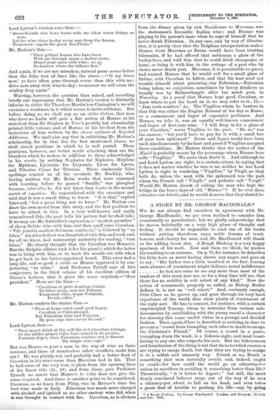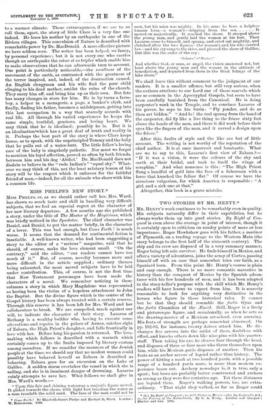A STORY BY DR. GEORGE MACDONALD.* WE do not always
find ourselves in agreement with Dr. George MacDonald ; we are even inclined to consider him occasionally as paradoxical ; but we gladly acknowledge that he moves habitually on a very high plane of thought and feeling. It should be impossible to read one of his books without getting therefrom some noble lessons of truth honour, and charity for man, and, Dr. MacDonald will thank us for adding, beast also. A Rough Shaking is a very happy specimen of his work. Now and then, we think, he pushes his teaching to an extreme. On p. 78, for instance, he describes his little hero as never having shown any anger, and goes on to say : "His father was a little troubled at the fact, fearing such absence of resentment might indicate moral indifference he had not come to see any more than most of the readers of this story now see, or for a long time will see, that there lies no nobility in evil retort of any kind." Now the action of resentment, properly so called, as Bishop Butler defines it, is not an " evil retort." And, curiously enough, little Clare as he grows up, and goes through his very hard experience of the world, does show plenty of resentment of the right sort. He has to consort, for instance, with a certain unprincipled Tommy, whom he restrains from various mis- demeanours by establishing with the young rascal a character for showing this same useful virtue in a prompt and decided fashion. Then, again, Clare is described as arriving in time to prevent a " crowd from trampling each other to death to escape the Christian's Friend." Of course, a crowd in a panic, trampling down the weak, is a hideous sight, and most humi- liating to any one who respects his race. But the hideousness and humiliation of the thing is not that these terrified creature s are trying to escape death, but that they are trying to escape it in a selfish and unmanly way. Friend or no, Death :s something that man naturally avoids, and, indeed, ought to avoid—for how could the world go on otherwise ?- unless he sacrifices in avoiding it something better than life ? Theoretically, " it is better to depart ; " but still, the most firmly convinced believer steps out of the way if he secs a chimney-pot about to fall on his head, and even takes a great deal of trouble to prolong bis life—say, by going
• A Rough Shaking. Fy George YfteDonald. London and Glasgow: Elackie and Son. 1891. to a warmer climate. These extravagances, if we are to so call them, apart, the story of little Clare is a very fine one indeed. He loses his mother by an earthquake in one of the Riviera villages. This convulsion of Nature is described with remarkable power by Dr. MacDonald. A more effective picture we have seldom seen. The writer has been helped, we fancy, by personal experience; but it is not every one who carries though an earthquake the robur et ws triplex which enable him to make observations that he can afterwards turn to account. One point is particularly noticeable,—the smallness of the movement of the earth, as contrasted with the greatness of the terror inspired, and, indeed, of the destruction caused. An English clergyman and his wife find the poor child clinging to his dead mother, amidst the ruins of the church. They carry him off, and bring him up as their own. But fate has many changes in store for him. He is by turns a farm- boy, a helper in a menagerie, a page, a banker's clerk, and finally, finding his father, becomes a midshipman, getting into this last occupation in a way that scarcely accords with real life. All through his varied experiences he keeps the same simple, truthful, gracious, and loving heart. We may think that he is idealised ; possibly he is. But it is an idealisation'which has a great deal of truth and reality in it. Perhaps the best part of the story is where Clare keeps house, so to speak, with the unprincipled Tommy and the baby that he pulls out of a water-butt. The little fellow's loving care of the baby is singularly pathetic. Nor must we forget to mention his loyal affection, proved so often by both friends, between him and his dog 'Abdiel.' Dr. MacDonald does not disdain to believe in the "rude Indian's" "equal sky." What- ever we may think of this, not the least salutary lesson of his story will be the respect which it enforces for the faithful friend of man,—indeed, for all the animals who share with him a common life.



















































 Previous page
Previous page